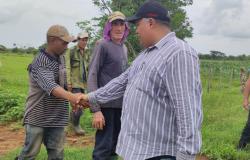Senator and animal activist Andrea Padilla called a political control debate to demand explanations from the National Unit for Disaster Risk Management (Ungrd) for the delays in the implementation of animal care protocols in emergencies.
According to data revealed by the congresswoman, since April 2024 more than 18,000 cattle died of hunger in various regions due to drought, and in May, heavy rains resulted in the death of more than 230,000 poultry and other cattle. in the department of Antioquia.
Now you can follow us on our WhatsApp Channel and in Facebook.
In addition to the most recent corruption scandals that permeate the entity, this critical situation is aggravated by the inaction of the Ungrd, which had a period of six months to establish the protocols, according to article 38 of the National Development Plan.
Senator Padilla highlighted that the delay of more than seven months has left thousands of animals dead and hundreds at risk. “The Risk Management Unit has been ineffective on this front. Not only due to the nonexistence of the protocols mandated by law but also due to the lack of support for municipalities, despite the fact that Law 1523 requires them to have resources to support territorial entities in their prevention, mitigation, and recovery efforts. , rehabilitation and immediate availability to deal with disaster situations,” said the parliamentarian.
A critical example is that of the Corporation for the Sustainable Development of La Mojana and San Jorge, Corpomojana. The environmental entity identified 548 wild animals at risk due to flooding. Of these, 322 are primates trapped in the treetops without access to foodso Corpomojana officials have tried to feed them with their own means, but these actions have not been enough without the support of the Ungrd.
During the debate, Padilla presented five crucial requests to the director of the National Unit for Disaster Risk Management, Carlos Carillo:
- Immediately issue animal care protocols in emergencies.
- Urgently attend to the animals in La Mojana and include veterinarians in the Unified Command Post (PMU) of the entity.
- Offer effective support and provide resources to the territories.
- Issue circulars ordering the inclusion of animals in territorial risk management systems.
- Create a special line in the Ungrd structure for animal care, responding to local requirements.
These measures seek to avoid future disasters and guarantee an adequate response in emergency situations, complying with the legal obligations established in Law 1523, in accordance with what was indicated by Senator Andrea Padilla.
The Vice Ministry of Agricultural Affairs, together with the Government of Sucre and other entities, held a meeting in order to coordinate food aid for the affected cattle in La Mojana. These aid, consisting of silos and cassava chips, will be directed to municipalities such as Majagual, San Jacinto del Cauca, Guaranda and Ayapel, affected by floods.
The Ministry of Agriculture, through a statement, reported on the installation of a PMU in coordination with mayors and governors of Bolívar, Córdoba and Sucre to address the emergency. Among the measures adopted, the purchase of 5,000 tons of cassava chips for small livestock farmers stands out. To support the rice sector, a census of the affected areas and producers is first required.
The Colombian Agricultural Institute (ICA), under the direction of Juan Fernando Roa, deployed brigades to accompany the mobilizations of livestock in Guaranda and Majagual. The Directorate of Carabineros and Environmental Protection (Dicar), for its part, will work in coordination with the authorities and the ICA to prevent smuggling and cattle rustling during the mobilization of animals.
At the time, Carlos Carrillo, director of the Ungrd, stressed the importance of having contingency plans ready for flood-prone areas. He also mentioned that it is irresponsible not to have an adequate management guide for these cases.
The Attorney General’s Office requested Carrillo information on the contingency measures implemented, the progress of the current contract and the audit reports.






